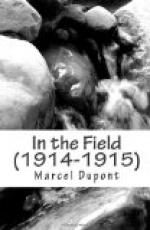I shall never forget what those days were to me. Days of overwhelming work, when, in a tropical heat, I was busy from sunrise to sunset, entering the names of thousands of men, registering the horses, giving certificates, and providing food for the lot. It needed some skill to find billets for them all; the horses were lodged in stables, riding establishments and yards, the men in every corner and nook of the vast district. It was tiresome work, and would have been almost impossible but for the general goodwill and admirable discipline. But all the time I was thinking of the fellows away in Belgium boldly reconnoitring the masses of Germans and coming into contact with the enemy.
At last, at eleven o’clock on the 28th of August, the colonel’s telegram came ordering me to go at once and replace my young friend, Second-Lieutenant de C., seriously wounded whilst reconnoitring. At six o’clock in the evening I had packed my food, strapped on my kit, and got my horses into the train. I set off with a light heart, and my fellow-officers of the Reserve and of the Territorials, who were still at the depot, came to see me off.
But how slowly the train travelled, and what a long way off our little garrison town in the west seemed to me when I thought of the firing line out towards the north! I made up my mind to try to imitate my faithful Wattrelot, who had been snoring in peace for ever so long. I stretched myself on the golden straw and waited impatiently for the dawn, dozing and dreaming.
At about eight o’clock in the morning the train stopped at the concentration station of N. What a crowd, and yet what order and precision in this formidable traffic! All the commissariat trains for the army muster here before being sent off to different parts of the Front. The numerous sidings were all covered with long rows of trucks. In every direction engines getting up steam were panting and puffing. In the middle of this hurly-burly men were on the move, some of them calm, jaded and patient. These were the railwaymen, who went about in a business-like way, pushing railway vans, counting packages, carrying papers, checking lists, and giving information politely and willingly. The rest were soldiers, lost, bewildered in the midst of this entanglement of lines which seemed inextricable. They were asking each other questions, swearing, laughing, protesting, and then they got into a train and were promptly hauled out and sent to another. But, with all this, there was no disorder, no lack of discipline. Everywhere the same admirable composure reigned that I had already noticed at the station of my little garrison town.
With Wattrelot’s help, I tidied myself up for a visit to the military authorities of the station. After many difficulties, and after passing through the hands of a number of sentries and orderlies on duty, I came into the presence of a kindly captain, to whom I stated my case: “These are my marching orders, Captain; I am to join the —— Light Cavalry. Do you know where it is just now?”




